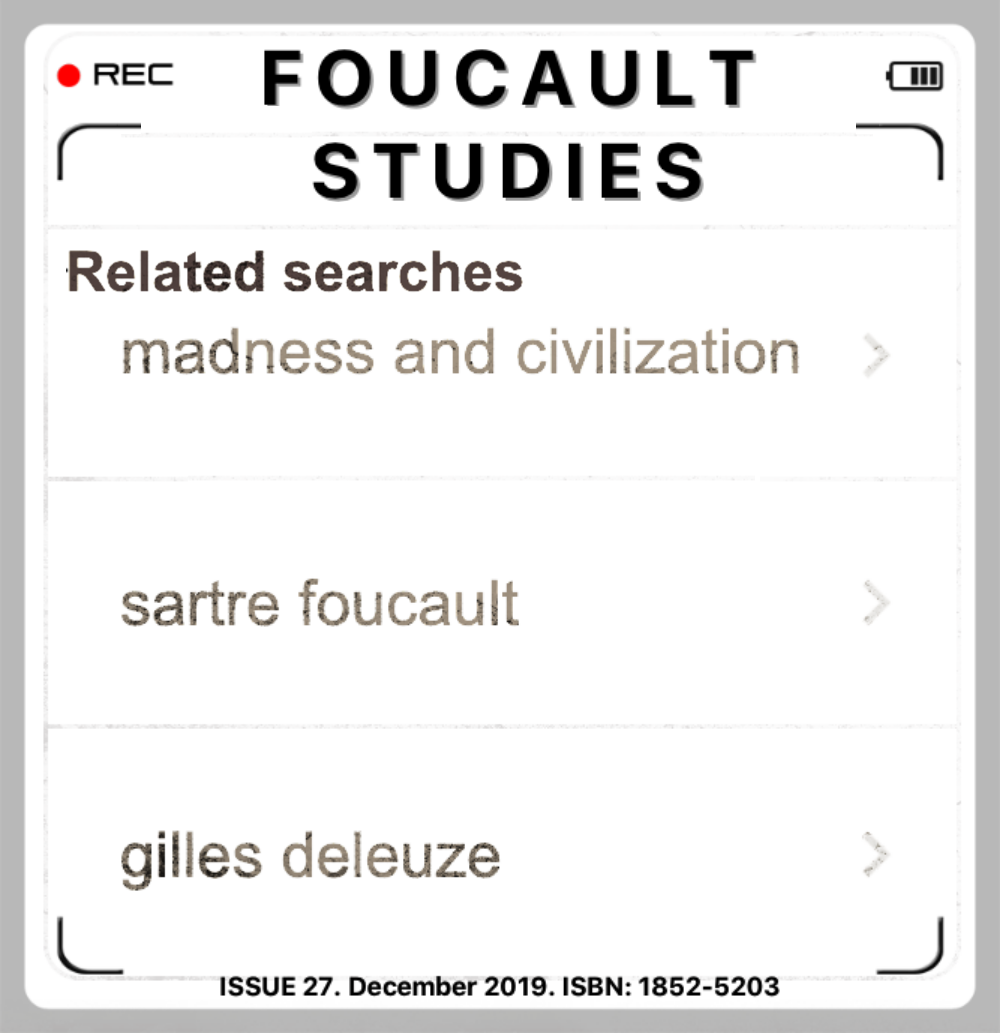Sirens in the Panopticon: Intersections Between Ainslean Picoeconomics and Foucault`s Discipline Theory
DOI:
https://doi.org/10.22439/fs.v27i27.5894Abstract
In this article, we attempt to synthesize the findings of the branch of behavioral economics known as “picoeconomics” (developed by George Ainslie) with insights from Foucauldian thought in order to demonstrate that a richer and more nuanced understanding of strategies for self-managing human irrationality can be achieved when both approaches are mobilized. Picoeconomic games can be modeled as an intrapsychic exercise of the disciplinary power thereby suggesting an important contributing factor to the formation of effective Ainslean will. On the other hand, picoenomic descriptions of the functioning of mind do not only align with Foucault’s concept of the “techniques of the self” but also point to the possibility of the transformation of disciplinary practices into modes of subjectivation once the former are fully internalized. On the basis of these findings, we propose an empirically testable hypothesis about the biographical correlates of strong Ainslean will and a prospective area of subjectivity research in the vein of Foucauldian studies.
References
Ainslie, George, "Impulse Control in Pigeons," Journal of The Experimental Analysis of Behavior 21:3 (1974), 485-489. https://doi.org/10.1901/jeab.1974.21-485
Ainslie, George, “Self Reported Tactics of Impulse Control,” The International Journal of Addictions 22:2 (1987), 167-179. https://doi.org/10.3109/10826088709027421
Ainslie, George, “Freud and Picoeconomics,” Behaviorism 17:1 (1989), 11-19. 10.2307/41236080
Ainslie, George, “The Dangers of Willpower, Including the Exacerbation of Addiction and Dissociation,” in Getting Hooked, eds. J. Elster and O. Skog, 65-92. New York: Cambridge University Press, 1999.
Ainslie, George, Breakdown of Will. Cambridge: Cambridge University Press, 2001.
Ainslie, George, “The Effect of Hyperbolic Discounting on Personal Choices,” Speech, Annual Convention of the American Psychological Association, Chicago, IL, August 22, 2002. Picoeconomics. https://doi.org/10.1037/e317002004-001
Ainslie, George, “Free Will as Recursive Self-Prediction: Does a Deterministic Mechanism Reduce Responsibility?” in Addiction and Responsibility, eds. J. Poland and G. Graham, 55- 88. Cambridge and London: The MIT Press, 2011.
Aristotle, Politics, trans. C. D. C. Reeve. Indianapolis and Cambridge: Hackett Publishing Company, 1998.
Ashraf, Nava, Dean Karlan and Wesley Yin, “Tying Odysseus to the Mast: Evidence from a Commitment Savings Product in the Philippines,” The Quarterly Journal of Economics 121:2 (2006), 635-672. https://doi.org/10.1162/qjec.2006.121.2.635
Bauer, Michal, Julie Chytilová and Jonathan Morduch, “Behavioral Foundations of Microcredit: Experimental and Survey Evidence from Rural India,” The American Economic Review 102:2 (2012), 1118-1139. https://doi.org/10.1257/aer.102.2.1118
Elster, Jon, Ulysses Unbound: Studies in Rationality, Precommitment, and Constraints. Cambridge: Cambridge University Press, 2000.
Foucault, Michel, The Care of the Self: Volume 3 of the History of Sexuality [1984], trans. Robert Hurley. New York: Pantheon Books, 1986.
Foucault, Michel, The Use of Pleasure: Volume 2 of the History of Sexuality [1984], trans. Robert Hurley. New York: Vintage Books, 1990.
Foucault, Michel, Discipline & Punish: The Birth of the Prison [1975], trans. Alan Sheridan. New York: Vintage Books, 1995.
Foucault, Michel, Istoriya bezumiya v klassicheskuyu epokhu [A History of Madness in the Classical Age; Russian translation; 1961], trans. I. Staf. Saint Petersburg: Universitetskaya Kniga, 1997.
Foucault, Michel, The Order of Things: An Archaeology of the Human Sciences [1966]. London and New York: Routledge Classics, 2002.
Foucault, Michel, The Hermeneutics of the Subject: Lectures at the College de France, 1981-82, trans. Graham Burchell. New York: Palgrave Macmillan, 2005.
Foucault, Michel, The Birth of Biopolitics: Lectures at the College de France, 1978-79, trans. Graham Burchell. New York: Palgrave Macmillan, 2008.
Gros, Frederic, “Course Context,” in The Hermeneutics of the Subject: Lectures at the College de France, 1981-82, ed. F. Gros, 507-550. New York: Palgrave Macmillan, 2005.
Herrmann-Pillath, Carsten, “Elements of a Neo-Veblenian Theory of the Individual,” Journal of Economic Issues 43:1 (2009), 189-214. https://doi.org/10.2753/JEI0021-3624430109
Hofmeyr, Andre, George Ainslie, Richard Charlton and Don Ross, “The relationship between addiction and reward bundling: an experiment comparing smokers and non-smokers,” Addiction 106 (2010), 402-409. https://doi.org/10.1111/j.1360-0443.2010.03166.x
Kahneman, Daniel, Thinking, Fast and Slow. New York: Farrar, Straus and Giroux, 2013. Laibson, David, “Golden Eggs and Hyperbolic Discounting,” Quarterly Journal of Economics 112:2 (1997), 443-477: https://doi.org/10.1162/003355397555253
Loewenstein, George and Ted O’Donoghue, “‘We Can Do This the Easy Way or the Hard Way’: Negative Emotions, Self-Regulation, and the Law,” The University of Chicago Law Review 73:1 (2006), 183-206.
McClure, Samuel, Keith Ericson, David Laibson, George Loewenstein and Jonathan Cohen, “Time Discounting for Primary Rewards,” The Journal of Neuroscience 27:21 (2007), 5796- 5804. https://doi.org/10.1523/JNEUROSCI.4246-06.2007
Milkman, Katherine, Todd Rogers and Max Bazerman, “Harnessing Our Inner Angels and Demons: What We Have Learned about Want/Should Conflicts and How That Knowledge Can Help Us Reduce Short-Sighted Decision Making,” Perspectives on Psychological Science 3:4 (2008), 324-338. https://doi.org/10.1111/j.1745-6924.2008.00083.x
Morse, Stephen, “Addiction, Genetics, and Criminal Responsibility,” Law and Contemporary Problems 69:1/2 (2006), 165-207. 10.2307/27592127
Raffnsøe, Sverre, “Michel Foucault’s Confessions of the Flesh. The fourth volume of the History of Sexuality,” Foucault Studies 25 (2018), 393-421. https://doi.org/10.22439/fs.v25i2.5593
Reyna, Valerie and Frank Farley, “Risk and Rationality in Adolescent Decision Making: Implications for Theory, Practice, and Public Policy,” Psychological Science in The Public Interest 7:1 (2006), 1-44. https://doi.org/10.1111/j.1529-1006.2006.00026.x
Thaler, Richard H., Sunstein, Cass R., Nudge: Improving Decisions about Health, Wealth, and Happiness. New Haven and London: Yale University Press, 2008.
Downloads
Published
How to Cite
Issue
Section
License
Authors retain copyright to their work, but assign the right of the first publication to Foucault Studies. The work is subject to a CC BY-NC-ND 4.0 license, but despite these restrictions, authors can take for granted that Foucault Studies will permit articles published in Foucault Studies to be translated or reprinted in another format such as a book providing a full reference is made to Foucault Studies as the original place of publication.



